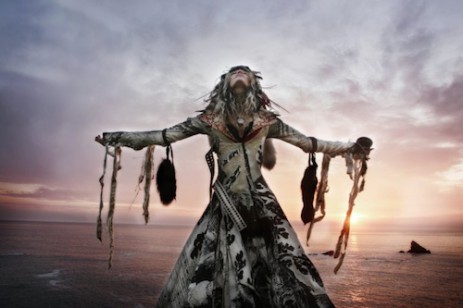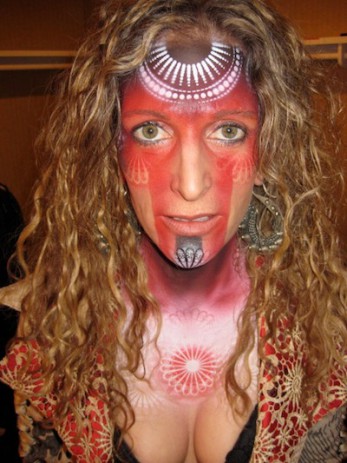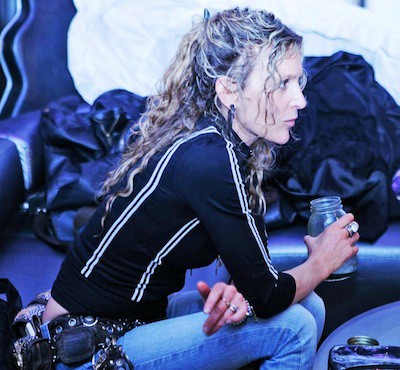Questions and footnotes by I.Zhuravlev & N.Sander
Don't be limited by other people’s limitations
Questions and footnotes by I.Zhuravlev & N.Sander
Don't be limited by other people’s limitations

Born at a radical time, in the heart center of the movement, Berkeley, California, in the early 60's. From the eyes of a child, Rigzin's earliest experiences were influenced by her unique surroundings. Spending time, on "Telegraph Ave", where her father worked, she was deeply effected by the anti-war, free speech, civil rights, and feminist movements. Dr. Martin Luther King, The Black Panthers, Gloria Steinam and the Beatles, all shaped her world view. Something new was taking birth, and she was a child of it.
Always an innovator, she was attracted to the arts, photography became her medium. Particularily drawn to East Indian Art, at 20 she took her first trip to Asia. Wandering, she found herself in holy Buddhist pilgrimage sites, there recieveing her first formal teachings. In this way her lifes purpose was revealed. After a year, she returned to finish her degree, graduating, summa cum laude, with a BFA, in fine art photography.
Rigzins' life changed dramatically, upon meeting her root teacher. Their connection was very strong and she immediately went into retreat. Later she married his son, and gave birth to her son, a recognized reincarnation. They traveled extensively on pilgrimages throughout India, Nepal, Bhutan, and Tibet, visitng many holy sites, and monestaries affiliated with the Lineage and family.
At 32, Rigzin was diagnosed with an aggressive form of lymphoma, (cancer of the immune system). Recieving experimentally high dosages of chemotherapy, she barely survived. In the recovering, was a deep process of rebirth, regrowth, restructuring. No longer able to live as "a lamas' wife" she retreated, to the pristine rural land on the isolated coast of Northern California. There all the practices, her lifes work, integrated, everything was different, she was becoming herself.
By an interesting twist of karmic fate, she revisited her roots as an artist, falling in with, "El Circo", an avant guard artist collective of the west coast underground. Bridging worlds, she would invite her friends to come visit. Hearing her prayers in the early morning hours, they were inspired by the peace and beauty invoked, and arranged for her to record. Random Rab created the first track from this original recording, producing a piece that merged the ancient blessing of the Tibetan Lineage, with modern electronic beats, the response was a compelling indication of things to come.

Question: How did your interest in Buddhism appear?
Rigzin: I was studying fine art photography, in college. I took an elective in East Indian Art. The professor was very scholarly and demanding; I thrive with challenge, and delved deeply into studying. Inspired, I became interested in going to India to see the ancient rock carved temples. Wandering through India, I ended up in Bodh Gaya, the place where the Buddha attained enlightenment. The Dalai Lama had appointed Tara Tulku to teach there as his representative. In receiving these first teachings, my life’s purpose became clear to me. I took Refuge and Bodhisattva Vows. I was 20.
Question: Tell us, please, about your meeting with your root Lama.
Rigzin: I stayed in Asia for 10 months, doing my first Vipassana retreats, and returned to finish school. During the next couple of years I received teachings from various Lamas. Then one day, a flyer came in the mail, with a photo of H.E. Chagdud Tulku Rinpoche. He was playing a Chöd drum.
I knew, without doubt, he was my teacher, and I knew that was "my" drum. I went to the teaching. I was late. The room was full. I did three prostrations, and when I looked up at him, I had an indescribable experience like nothing I had ever known. Everything stopped, and it was just him and I. I felt fully enveloped in his energy field. I was introduced to the nature of mind.
Rinpoche was also a Tibetan doctor. I made an appointment to see him for a consultation. I was so overwhelmed, and could barely speak, I just cried. He gave me a kleenex, and said that I was a bodhisattva. That I shouldn't worry, that now I had found him, and that he would help me. He gave me his phone number. He was going to give the preliminary, (Ngondro) teachings, and said I should come.
I went to the retreat; there were about 25 of us, and camped on some land that had just been donated to him. The first thing he said to me, in his English was, "you, when 3-year retreat doing?" I had already thought about it, and we began planning where my cabin would be, on the top of the mountain. I said I wanted to learn Tibetan, because I wanted to speak to him in his own language. He arranged for me to move to his center in Oregon, and begin studying Tibetan language with his translator, Chokyi Nyima. During that month-long Ngondro retreat I became his personal attendant, cooking his food, and doing his laundry. We were inseparable, I was utterly and completely happy.
A great Lama, H.H. Khentyse Rinpoche, had come to the U.S. Rinpoche and I decided to go to Colorado to see him, and the whole Sangha ended up coming. He asked Khentyse Rinpoche to do a "mo" (divination) , and it said i had extremely important karma with Rinpoche’s son.
I moved to Oregon and lived in Rinpoche’s house, studied Tibetan, and did Ngondro practice. For the first time since his exile, Rinpoche decided to return to Tibet. I took him and his wife to the airport, with a plan to meet them in China to go on a pilgrimage to the Five Peak Mountains, Wu Tai Shan, a place holy to Manjushri. It was there that I met his son.
Question: During three years of retreat did you ever want to go to the outer world?
Rigzin: No. I was a very devoted practitioner; all that I wanted was to attain enlightenment for the benefit of all beings. I felt a great urgency, with no time to waste. I took the teachings very seriously, and gave up all worldly desire.
Question: How can you estimate the time spent in retreat? Are you satisfied with the results you achieved?
Rigzin: I was very fortunate, in many ways, to do a retreat with a fully trained tulku, who I could ask my every little questions. He also trained me to sing the ceremonies in traditional style.
Noshyul Khen Rinpoche came and gave us teachings. H.H. Khentyse Rinpoche was overseeing our practice from Nepal. And of course, Rinpoche, who now was my father-in-law, and Popo (grandpa) to his new grandson, came to see us often.
My first retreats were hard, struggling with sitting, dullness, trying to be aware of my mind and to meditate. But after many years, you do start to get it. It becomes easier. For me, there was a long process of purifying karma, gathering the two accumulations of merit and wisdom. I put in, many, many years of diligent, disciplined hard work and effort. My teacher was old-school from Tibet, and we studied traditionally.
I have always held a strong belief in the truth of these teachings. My faith was strong and I was very fortunate to have persevered, and not to have given up. I came out having received a traditional training, something I now recognize the value of, and am grateful for. I very much hope to go into an extended retreat again in this lifetime.
Question: Many people are happy to be monks and nuns while studying. They practice diligently and live in spiritual or monastic communities. But, after having returned to the world, they often feel as being outsiders and prefer to return to a common lay life. What do you think about this?
Rigzin: Our lineage is Nyingma, which has monastic and yogic practices. My teacher was a yogi or "householder," married with children. I think the yogic lineage is well suited to householders, like the majority of western practitioners. Integrating the worldly and the spiritual life. When I first met Rinpoche I told him, "I wanted to "save the world"," he said," How can you save the world? You can't even save yourself." He instilled in me the foremost importance of meditation and retreat.
I spent years in retreat, (after the original three). Eventually it became easy - I had finally found the bliss and ease of meditation. My desire was to stay alone in the woods, believing that prayers and meditation are of greatest benefit, for all beings. I was happy, resting in a place of equanimity and contentment. But then, I came to a place where I began to feel an undeniable calling to go back out in the world. I prayed, and it became clear, beyond doubt. I was not allowed to rest so easy. I was being pushed back out into the world to follow my karma and try to fulfill my vows to serve others.

I have always been an "outsider", I still am. It is my devotion to a spiritual way of life that makes me odd to the world, and my unusual activity in the music world that makes me odd to traditional Buddhists. I think you have to stay true to yourself, fearless, independent. My upbringing and schooling as an artist taught me to express what is true in me, no matter what the social convention is - even if you must stand alone, questioning, stretching social boundaries.
I think all practice has benefit. If you practice in a monastery or retreat, or integrated into a worldly life, it is all good. These days, I have some of both, I find this to be the most supportive to my spiritual development for now. We are all unique, in these very unique times, and we should follow what we know is the truth within us, or seek a qualified guide.
Question: What was your experience of interaction with representatives of women’s spiritual communities?
Rigzin: I actually haven’t had any I can think of; I wish I had. The lineage I come from is very male based. I do have a lot of thoughts about the importance in women’s perspectives in spiritual awakening for the whole. I am speaking at a retreat this month, and am making this my topic, so I can write you more on this topic [later], or we can save it for a whole other article. This is a subject I am very interested in, and is something that is coming through to share.
Question: How did you react on your teacher's H.E. Chagdud Tulku Rinpoche passing away?
Rigzin: Rinpoche lived here in the U.S. and I, was very blessed to be close to him for many years. Then he moved to Brazil. This was extremely hard on me. When he told us that he was leaving, I was distraught. But he had taught us well, and was leaving for new lands. He would return, to teach and visit. At that point, I felt like I was a baby bird being kicked out of the nest. This changed things for me, and I had to rely more on the Lama within. When I was in the 3-year retreat, Rinpoche said, if you have a question for me, hold it in your mind and the answer will come. It always does.
When Rinpoche died, I felt I had been prepared to be on my own for awhile. Rinpoche had great activity, I felt like a little bit of him went into each of us, his close disciples, to carry on his work. He had always said that in his next life he wanted to be a rock star, and looking back, maybe this was when the seeds of my unusual future began to grow. I felt with his passing that he dissolved into us, and we were to carry on, taking it to the next level, of our spiritual development.
I still miss my Rinpoche very much. Whenever I am making serious decisions in my life, I go into retreat and pray to him, and I have felt his guidance and blessing, directly like it always was, and always will be.
Question: What changed for you after your illness?
Rigzin: I had a very aggressive form of cancer of the immune system (lymphoma). For all the years of practice, it was the illness that was the turning point. I felt that, even with the deep and devoted relationship I had with my guru, he could never have pushed me as far as the illness did. I saw it all as a blessing, and took it as medicine. I did lots of Tonglen practice, Rinpoche sat for hours by my bedside in the hospital, blessing me with his meditation.
Cancer treatment is an annihilation on many levels - I experienced death, from the ego to the cellular level. It stripped away everything I could hold on to, no past, no future, and no self. There was nothing left except ongoing awareness of the present moment. I "died," and left everything behind. The only reason, I had the will to survive was for my son. Like a tree cut at the trunk, I sprouted a whole new being - I was truly reborn.
After "dying", I realized that to fulfill my life’s purpose, I needed to truly embody my "true" self, throwing off all social bonds and constraints. Being married to a Lama and then being the mother of a Tulku, there were many expectations put on me, and my son, to conform to a very strict tradition. I was happy to do this, I felt I was serving the Dharma, and that it was breaking down my "ego" or attachment to self clinging. I thought it was beneficial to give up my identity, and conform to the tradition.
I studied very traditionally, and am very grateful that I had that opportunity, to study with the old masters from Tibet, of which very few are now left. I say "if you want to be a rock star, study classical music." But, I think most people these days aren't willing to do the hard work, they just want to be a rock star. The old school traditional ways are very strict. I worked very hard, and because of that, I received something very rare and precious.

Question: Please tell about your feelings when you knew that your child is a tulku.
Rigzin: Looking back I am sure the "karma" H.H. Khentyse Rinpoche foresaw was our son. I was very happy, to be the mother of a being devoted to serving others. Khentyse Rinpoche named him, Orgyen, while he was in my womb and Orgyen Jigme Lordro Dawa, at his birth. I thought it was going to be like a perfect fairy tale, and we would live happily ever after. It was not like this at all.
It was a clash of East and West, and our son was in the middle. The father’s side was of the traditional, old Tibetan school way. Monastic training was harsh and disciplined, like Catholic school 50 years ago. I was from a very liberal, California background, and was very permissive and loving, believing in the innate wisdom and purity of the child. I could endure the hardship of traveling the path myself, as an adult. But as a mother, I couldn't bear what seemed like an unnecessary and outdated form of education for my child.
My son did end up receiving his full training, in monasteries in Nepal and India, and here in Rinpoche's monastery in the U.S., with a tutor sent from Tibet. It seems to me, he has a role in bridging these two cultures. His birth is part of the coming of the Dharma to the West. Knowing the extremes of both sides, he has the experience to know what is most beneficial from each.
Question: Do you have any plans or commitments for the near future?
Rigzin: I am working on my next album. The first album, "Union," was made as a demo, to give examples of the many ways prayers and mantras can be woven into modern music. It goes, "from meditative, to the dance floor," and is very eclectic. This next album is called "Transition," and will be prayers to help those through the process of dying, and for all the deaths, transitions, we go through in life. It will be very peaceful and enlightening. I am simultaneously working on another album, "Protection," that will be all protective prayers. This one is going to be danceable, and more suited to the clubs.
Question: You lead a very unusual way of life for a person who did a three-year retreat. You are making music, performance and modern art. Do you just live life the way you like, or consider it to be a modern way of preaching Dharma as well?
Rigzin: I have always been unconventional, of the avant-guard, originally an artist, and always a ground breaker. I think this is what allowed me to go to India, get married, and to give birth to an incarnation. I have always 100% devoted my life to the Dharma, there was no other thought for me. And now with the music, this is just how it has manifested.
In my wildest dreams, I never imagined that I would be singing. I am very shy, and get nervous to speak in front of even a small group of people, so singing in front of vast amounts of people is pretty much the worst thing I could imagine. But this is how it has worked out, and I really don't feel it is "me". I just hold my meditation, and sing, bringing the blessings from the lineage and the dakinis through. From the time in retreat, when things got easy, to now, I feel that this path, of singing, has brought me to much deeper levels of awakening, then if I had just stayed in retreat. And after putting out the album, and all the shows I have done, and people who have heard these prayers, it is like a snowball, growing, and gaining momentum, and my path is unfolding and evolving at an accelerated rate.

Question: To what extent is it possible to teach Dharma through the means of modern art and show business? Will people consider it seriously or will they just watch it as an exotic show without wanting to change their lives?
Rigzin: My prayers and aspirations have always been to first serve those most in need. I sing in night clubs, Las Vegas, some very dark and dirty places, far from the dharma center. From the response I get, it is amazing what people receive.
I just hold my meditation, to the best of my ability, and connect to the lineage; this is a challenge for my practice, (much more difficult then meditating in my little cabin alone in the woods). But people get it, and they love it, and are so grateful to receive the connection. People tell me over and over how much these songs help them, and usually they have no idea even what they mean, or what my practice is, but it comes through. Throughout the ages, shamans and healers have transmitted their realization, through songs; it feels like I am also doing this.
I am just beginning, I have so much to bring through, but my life is half worldly and half retreat. I live alone in the woods with my wolves, in a very retreat like life, but I also lead a worldly life. There is never enough time for me to meditate, make music, do shows; take care of all my responsibilities. But I trust it is all how it should be, and that if it is meant to be, I will be able to share many things with whoever I have the karma to connect with. I can only do, what I can do, but I have many aspirations, I pray that I will benefit those who would not normally find these precious teachings. And for those who just watch it as a show, or maybe even think it is weird, that is ok too. "May all those with whom we have had good or bad karmic connection, be embraced by the Victorious Ones..." Sometimes powerful connections are negative ones, we never really know how it will manifest, but it is a connection nonetheless.

Question: Your musical preferences?
Rigzin: I really know very little of modern culture. I live a very isolated life in the woods. My friends are always amazed at how I little I know of modern culture. But if anyone has any advice on music I should listen too, I am always interested in learning new things.
Question: Being aware of all the risks associated with spiritual materialism, what methods of Tibetan Buddhism, in your opinion, can be most beneficial for people in modern world?
Rigzin: Tibetan Buddhism is a path of meditation. I teach basic meditation to people. The teachings can get very complex, and there are many, many levels. I am a devoted student of all the many teachings. But it really comes down to an experiential understanding, which one finds by practicing. No need to talk, or theorize debate or process, just meditate, plain, simple. I think it is best to find a teacher who has some experience, and can help guide your mind, through the experience of their practice. And then, practice. To practice on a daily basis, is very important.
Question: Do you think that Buddhism in the West will have some new form in a hundred years? People of European and American origin will be teaching Dharma most probably. Will it be degradation or growth?
Rigzin: Buddhism came from India; the Buddha was a Hindu. His teachings were contradictory to the traditions of his times. There is no doubt that Buddhism will develop a Western version. Just as there is: Tibetan Buddhism, Zen Buddhism, Theravada, and Mahayana. There are many schools of Buddhism even within the Tibetan tradition. We are witnessing this process right now. I personally am very grateful, to have received the lineage traditionally. But I cannot judge what is right and what is "wrong"? This is not what the teachings say. We recognize impermanence, "all that is born must die," and the Buddha even said everything must be adapted to time and place. I cannot say if it will grow or degrade, all we can do is do our best, hold to the truth, and pray that the truth of these most precious and exalted teachings survive to benefit beings, as I have experienced their benefit myself.
Website of Rigzin Tromge http://www.rigzin.net
Page on My Space http://www.myspace.com/rigzintromgemusic
